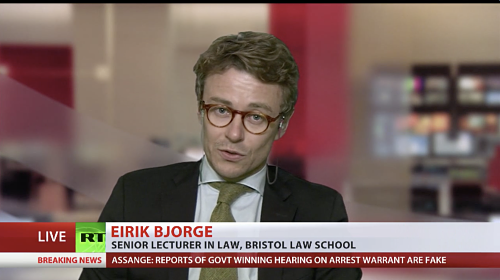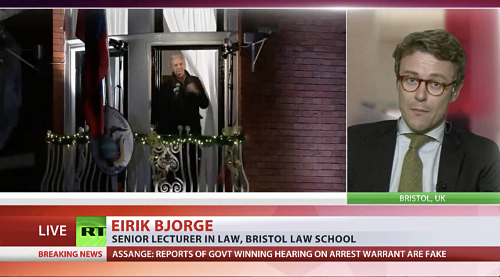Assange, 46, skipped bail to enter the Ecuadorian Embassy in 2012 to avoid extradition to Sweden over allegations of sexual assault and rape, which he denies. Though Swedish prosecutors dropped the investigation against him, he faces arrest if he leaves the building in Knightsbridge, London, for breaching his former bail conditions in the UK.
Having provided counsel to the European Court of Human Rights and the International Court of Justice on matters of international and human rights law, Dr Eirik Bjorge was invited to comment on the Assange case. Here is the transcript of the interview that took place on 6 February 2018:
Do you expect the arrest warrant to be dropped today?
"That would be the expectation, yes now we’re still waiting as you said to read the full judgement and to see what is actually being decided in court today, but that would be the expectation, yes."
Even if Assange does win the case today, he still fears he might be extradited to the US, how badly is he wanted in Washington?
"Well, that’s a matter of speculation really, but if we believe what is being said in the US he is wanted very badly. He is very much a most wanted individual in the United States is what we read in the newspapers and it seems to me that someone who reads that sort of thing about him or herself in newspapers has every reason not to want to go to the US."
Is there a chance that Assange will leave the Embassy any time soon, particularly considering the Swedish case which triggered the whole Embassy saga in the first place and that’s been dropped for some time now?
"It has, as you say it has been dropped. The Swedish prosecutor decided last May to discontinue the investigation so he has no case to answer to the Swedish authorities anymore and that of course is why one would expect that the British arrest warrant, which came from, flowed out of the Swedish European arrest warrant and the wish on the part of the Swedish state to have Mr Julian Assange extradited, would also fall away. That is why one would expect that there being no Swedish prosecution, there being no Swedish investigation into him, the British arrest warrant would also go away and that the British Court will therefore find that it was disproportionate now under law for a British arrest warrant still to continue to operate against him."
The UN did earlier rule that Assange is being arbitrarily detained, now as a law lecturer how can the British Government still continue in its stance, is it breaking or even bending any laws here?
"It has certainly decided not to do anything to follow that ruling by the United Nations Working Group on Arbitrary Detention. What the UK did was to try to avail itself of the opportunity to have it reversed within the UN system and the UK lost, it failed in its bid to have it reversed, so the UK remains bound by that decision and it is incumbent on the UK to everything it can to follow it. If it doesn’t, then plainly as you say, it is in breach of international law."
Now Assange has said he fears being extradited to the US if he leaves the Ecuadorian Embassy and he fears that the punishment may even be the death penalty. Given his huge following and the amount of support he has, do you think that likely that he would face the death penalty in the US?
"That is a very difficult question. I think what is likely is that is he were to be in some way whisked off to the US, extradited or rendered in some manner, then he would face an extremely unpleasant situation there. Whether it’s actual death penalty carried through, or some sort of maximum security detention which has been the case with Chelsea Manning, it is of such a magnitude that it would be likely to be illegal under European Human Rights Law, to allow for him to be sent to the US. So whatever the exact outcome, it would be a deeply disagreeable one and one which would be dangerous to his personal safety."

